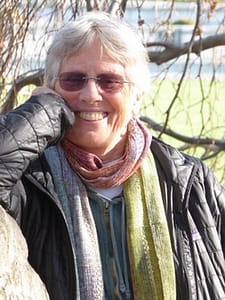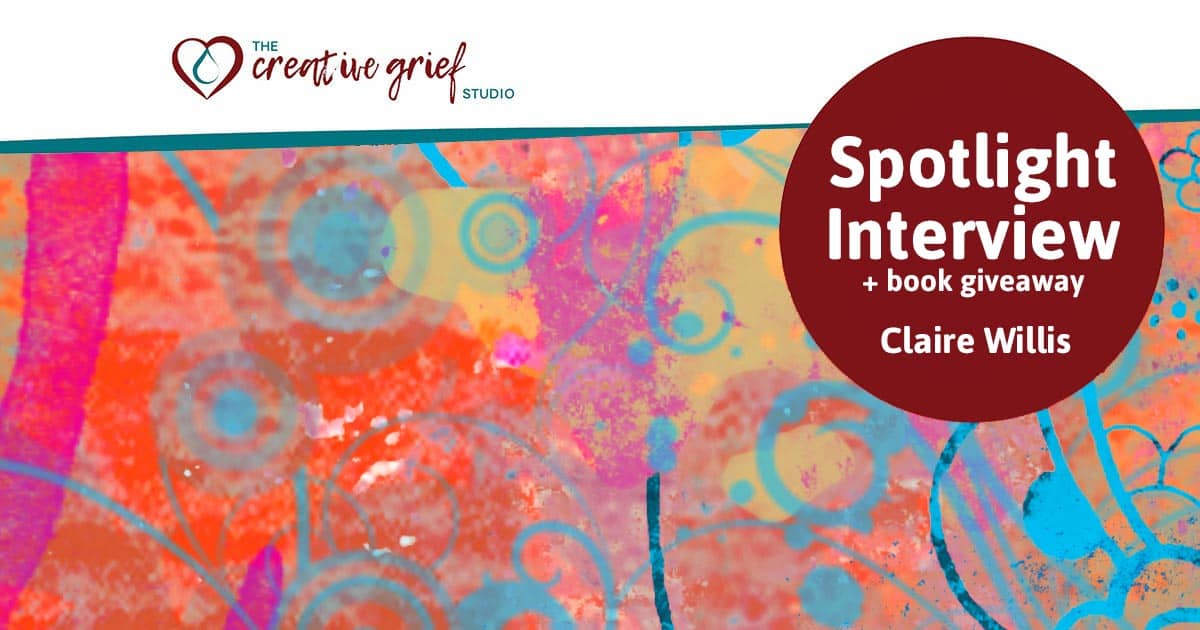Giveaway: print or eBook copy of Lasting Words

This giveaway is now closed. Congrats to you, Cynthia H.!
The Interview with Author Claire Willis
Creative Grief Studio Alum Claire Willis is a clinical social worker, lay Buddhist chaplain and yoga/meditation teacher who has specialized in oncology, therapeutic writing and bereavement for the last 25 years. Claire currently works at Facing Cancer Together which she co-founded. There she facilitates support, bereavement and therapeutic writing groups. She is also an adjunct faculty member at Andover Newton Theological School where she co-teaches Spiritual Practices for Healing the Mind, Body and Soul. Claire is co-author with Marnie Crawford Samuelson of Lasting Words: A Guide to Finding Meaning Toward the Close of Life and their new forthcoming book, Opening to Grief. Claire maintains a private practice working with bereavement and end of life issues in Brookline, Massachusetts.
Claire connected with us to share a bit about her experience with the book and her heARTwork:
Q: What led you to write this guide of written reflection for people coming to the end of their lives? What were your intentions in creating it?
 Claire: In its original form this book began as my final thesis for a Buddhist Chaplaincy program I had enrolled in at Upaya Zen Center. My teacher, and author, Joan Halifax suggested that I publish it. At the time, I was facilitating support, caregiver and bereavement groups and had a small private practice where I saw individual clients.
Claire: In its original form this book began as my final thesis for a Buddhist Chaplaincy program I had enrolled in at Upaya Zen Center. My teacher, and author, Joan Halifax suggested that I publish it. At the time, I was facilitating support, caregiver and bereavement groups and had a small private practice where I saw individual clients.
I researched the most common end-of-life concerns people had. Often people expressed the wish to feel that they were known, that they would be remembered, and that their lives had made a difference to their loved ones. I also saw, especially in my bereavement groups, the power of passing on hand written words, to loved ones and how certain feelings can best be conveyed in writing.
One participant in my bereavement group shared an especially poignant story. His wife, a young mother to their daughter, had told him that when she died, he would find a note for their daughter that he should pass on to her. When he retrieved the note for his daughter, he found one she had left for him. In it she urged him to find new love and share with another woman what they had shared. He brought this letter to our group and read it to other members, few of whom had had this kind of conversation. In it were expressions of gratitude, forgiveness and bits and pieces of her life she wanted him to be sure to remember. She also shared words about what she hoped he might convey to their daughter as he raised her as a single parent. An excerpt of the letter is in the book.
I wanted to create a guide that offered a structure to those moving toward the close of life as well as for people aging since life review and looking back are developmental tasks in the last third of life. My hope was that it would offer people a way to find meaning through reflections and passing on their values, life lessons, expressions of gratitude, stories, and forgiveness.
Q: What did you learn about grief before and during the process of writing the book?
Claire: I learned how vitally important it is to grieve if your life is to remain vital and your heart to remain open. I learned that there are as many different expressions of grief as there are people who grieve. I also learned that the stage model has been a huge encumbrance to people as it has been misused. Meditation, mindfulness, writing, art, gratitude, and the natural world are all ways that I found actively support the expression of grief.
Q: Why did you choose writing as the creative medium for your readers to use as they process their end of life experience?
Claire: Written words never matter more than they do at the end of life. Expressions of joy and sorrow, the desire to connect with loved ones, ways of finding comfort for yourself and strength for others – all are vital when time is short. But perhaps most pressing is the search for meaning.
Often in my bereavement groups people expressed regret that they did not have anything in writing from their loved one. I heard this most often in my young adult group for people who had lost parents.
I also think that writing is a useful tool as it calls forth a certain level of reflection that speaking does not require. It diminishes reactivity and draws more from responsiveness. We are able to find our unencumbered voice without dealing with the subtle reactions of those around us. It is especially helpful with apologies, expressions of gratitude and appreciation.
Q: Your book is organized into the categories of: Your Journey, Gratitude, Hope, Forgiveness, Wisdom, Prayer, and Endings. How did the idea of organizing it this way occur to you? Why is it important?
Claire: These categories were the result of the research I did about common end of life concerns. This is where people’s attention often went when they knew they were diagnosed with a disease. Incidentally, it was applicable as well to those who were aging into the last years of their life. I could have named the book Lasting Words: A Guide to Finding Meaning as We Grow Older.
Q: Where can someone buy a copy?
Claire: The book can be ordered online from Amazon and you can learn more about the book and my work at LastingWordsBook.com.

